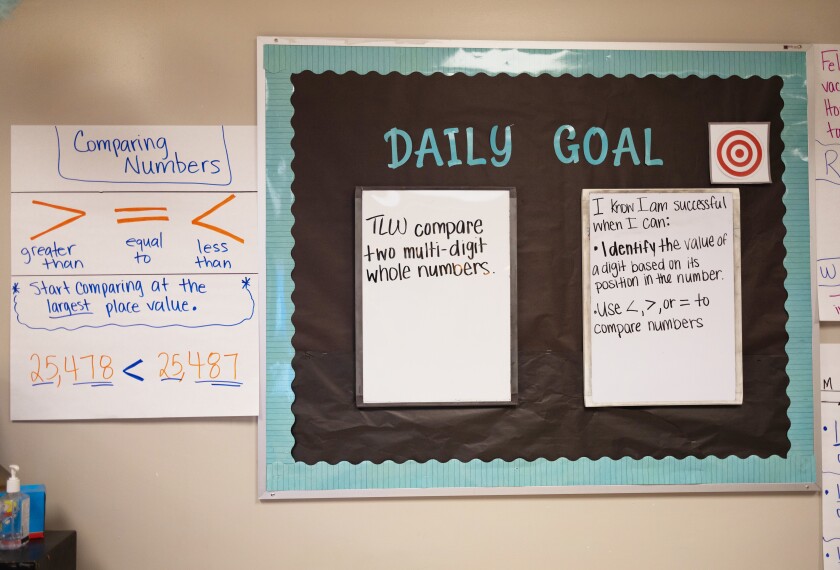The vast majority of students won’t take algebra until middle or high school.
But teachers can start laying the groundwork for this pivotal class a lot sooner, some researchers say—and instilling these algebraic thinking skills when children are young could improve their math ability overall.
That’s the theory behind Project LEAP, an early algebra program developed by researchers at TERC, a math and science education research nonprofit, and several colleges and universities.
Studies have shown that the intervention improves measures of algebra content knowledge and thinking skills for students in grades 3-5—gains that persist into 6th grade. Now, ongoing research funded by the National Science Foundation asks whether these lessons can benefit students in K-2 as well.
The research connects to larger debates about how much conceptual knowledge young students need as they learn early math. Surveys have shown that K-12 educators tend to place more importance on math fact fluency, while the post-secondary instructors who train them are more likely to emphasize problem-solving and mathematical thinking.
But research suggests that many of these skills actually develop in an iterative process, with procedural knowledge supporting deeper conceptual understanding, and vice versa.
Building algebraic skills in elementary school follows the same logic. “The kinds of things we’re doing, operations on numbers, are deeply synergistic with the arithmetic they’re doing,” said Maria Blanton, a senior scientist at TERC and a principal investigator on the project.
Traditionally, early grades math focuses on arithmetic: foundational skills like adding, subtracting, multiplying, and dividing. Students ideally get comfortable manipulating numbers. But then, “they’re dropped into a class where, all of the sudden, the numbers become letters,” said Blanton.
Project LEAP aims to smooth that transition, preparing students to speak “the language of algebra,” said Angela Gardiner, a senior researcher at TERC and a co-principal investigator on the study.
The elementary schoolers aren’t working with Algebra 1 content—they’re not solving equations or simplifying radical expressions, Blanton said. Instead, the lessons introduce “habits of mind” that are core to the subject, such as generalizing, representing, and reasoning.
“Our focus is not on the [equations] you do, but the ways you think,” she said.
Lessons focus on conceptual understandings
In the current study, 41 schools were assigned to either implement Project LEAP lessons in K-2 or continue with their usual math instruction. Teachers started using the materials this September, and the study will track outcomes through May 2027.
The lessons focus on teaching core concepts that underpin success in algebra—like understanding the meaning of the equals sign.
The equals sign represents a relationship: The quantities on one side are equal to the quantities on the other. Other research has shown that understanding the relational nature of the equals sign supports students’ ability to solve equations in algebra.
But young children can have the misconception that the equals sign is an operational symbol that means “the answer comes next,” the Project LEAP lessons explain.
“I assumed that this was a very elementary concept, and they would have that going into it. I assumed that those early lessons would be a review, but it wasn’t,” said Robin Hiatt, an elementary math teaching and learning specialist in Johnston County schools in North Carolina, who participated in the Project LEAP 3-5 study as a 3rd grade teacher.
Hiatt remembers students not understanding expressions that didn’t include an operation—they were confused by the idea that 8=8, for example. “We had to take it back to a real hands-on, conceptual level,” Hiatt said.
The lessons don’t take the place of arithmetic instruction, but rather extend it, said Blanton. In early grades, for example, students learn which numbers are even and odd, and why, she said. The early algebra lessons teach students about the characteristics of these numbers, allowing them to make generalizations about how odd and even numbers operate.
That might sound complicated and abstract, but the lessons aim to make these ideas concrete. For example, they represent numbers with cubes. Every even number is made up of pairs of cubes, but odd numbers have an extra singleton.
This aspect of odd numbers explains why two odd numbers added together always make an even number—because their singletons join together to make a pair. “That type of representation-based argument is general,” Blanton said.
In the previous study in grades 3-5, students using Project LEAP got better at making these kinds of representational arguments, which are core to algebra, compared to their peers in the control group. But their overall ability was still low, Blanton said.
Hopefully, she said, giving students even earlier practice with this skill could boost scores further.





